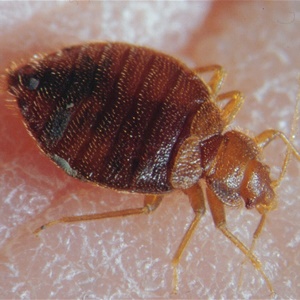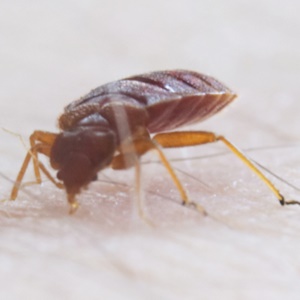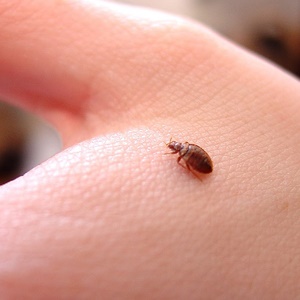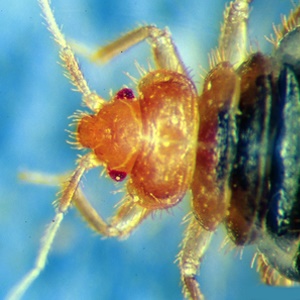Bed Bugs
Pest advice for controlling Bed bugs
This common pest once associated with unhygienic surroundings is prevalent due to a number of reasons, including increased travel, the use of second-hand furniture, and suspected tolerance to some pesticides. These bugs still occur with regularity, particularly in multi-occupancy buildings with rapid resident turnover, for example, hostels, hotels, holiday camps and blocks of flats.

Appearance
Adult Bed bugs resemble a small brown disc, measuring up to 6mm in length. It is wingless but the legs are well developed and it can crawl up most vertical surfaces. Their elongated eggs are cemented in cracks or crevices close to the hosts (which for Bed bugs are humans). The early stages of the Bed bug (nymphs) are tiny making them hard to detect with the naked eye.
Characteristics
Bed bugs can usually be introduced to your property as they attach to luggage, bags, and clothing. Bed bugs may also be introduced through second-hand beds, furniture, and possessions.
Bed bugs can also travel from one room to another in search of food, or, after mating. Sometimes this may be a neighbouring property which then can create new infestations throughout multi-occupied premises.
Habitat
Mainly active at night Bed bugs hide in crevices in the bed, surrounding furniture, and also behind skirting boards, under loose wallpaper, behind pictures and even in plug sockets to name a few.

Diet
Bed bugs need to feed on the blood of a human host. However, in some cases, they can survive up to a year without feeding.
Why control Bed bugs?
Bed bug bites cause red, irritating marks/ lumps. Not everyone reacts to the bites, however, some people develop a more severe skin reaction and can experience disturbed sleep.
Bed bugs are not known to spread diseases. However, they can cause irritation and distress. Bed bugs can also ruin an organisation's reputation. If clients and customers experience a Bed bug infestation in the premises you manage, they are likely to complain and request a refund, report on your company negatively and be unlikely to want to do business with you again.

How to prevent Bed bugs
It's impossible to prevent a Bed bug infestation as they are generally spread through bad luck. However there are some things you can do to reduce your chances of getting an infestation: Before staying or moving into accommodation, make sure you check for signs of Bed bugs.
Avoid taking any second-hand bedroom furniture without checking it thoroughly. If you have stayed in an infested room, upon arriving home, immediately check your luggage and clothing for bugs. If you find Bed bugs, to remove the bugs and eggs your luggage, clothing and bedding there are a few things you can do. Either; wash everything at a ‘hot' (60°C) temperature setting; tumbled dry at a ‘hot setting for at least 30 minutes; dry clean everything; or place everything into a bag and then in the deep freezer for at least 3 days.
For some businesses such as hotels, a proactive monitoring regime by a professional pest control organisation can help detect early signs. Also, training your staff in what to look for when they are cleaning and working within the rooms will mean you can detect a problem before a guest does, thereby protecting your reputations.
Signs of an infestation
- Red irritating bites, typically in rows on your neck, shoulders, back, legs or arms.
- Clusters or dark spots (about 1mm wide) that look like an ink dot are usually found on the bed frame or on the bottom side of the mattress.
- Small blood smears on the bed linen or headboard.
- Finding the small brown insects in and around your bed frame and sleeping area.

How to get rid of Bed bugs
For a suspected Bed bug infestation, we strongly recommend you act immediately by contacting a professional pest control company.
Self-treatment of a Bed bug infestation is unlikely to be successful. Failed treatments will occur if the accurate knowledge of the Bed bug is absent. A trained professional will have the technical knowledge and access to a range of professional use products and equipment which are not available to the public.
Having problems with Bed Bugs?
Use a trained professional pest controller call us on 01269 844503 / 07772 289648 or email us on [email protected]



